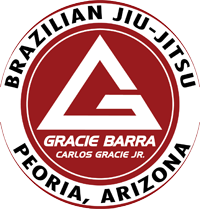The Philosophy Behind Brazilian Jiu-Jitsu
At Gracie Barra Peoria, we know that Jiu-Jitsu is not just a physical discipline; it is a way of life. Beyond the mat, Jiu-Jitsu carries a profound philosophy that extends beyond the boundaries of the local academy. For this blog, we examine the philosophical aspects of Jiu-Jitsu, uncovering the lessons of humility, respect, and the relentless pursuit of continuous improvement that shape not only practitioners on the mat but also guide their lives off it.
Humility in Victory and Defeat:
At the core of Jiu-Jitsu philosophy lies the virtue of humility. Unlike other martial arts where the emphasis might be on dominating opponents, BJJ instills the importance of recognizing your vulnerabilities. On the mat, practitioners experience both victory and defeat, teaching them to remain humble in success and resilient in failure.
This humility extends beyond the academy walls, impacting the way Jiu-Jitsu practitioners interact with the world. In daily life, humility becomes a tool for effective communication, collaboration, and personal growth. Embracing the idea that everyone has something to teach and something to learn fosters a mindset of continuous improvement.
Respect for Others and the Art:
Respect is a fundamental pillar in Jiu-Jitsu philosophy. On the mat, practitioners learn to respect their training partners, instructors, and the art itself. This respect is not merely a formality but a genuine acknowledgment of the shared journey and the symbiotic relationship that develops between training partners.
Off the mat, this respect translates into a broader appreciation for diversity and understanding. Jiu-Jitsu practitioners learn to respect different perspectives, backgrounds, and approaches to life. This inclusive mindset fosters a sense of community, breaking down barriers and promoting unity in an increasingly diverse world.
Resilience in the Face of Challenges:
Jiu-Jitsu is not an easy path. It is a journey filled with challenges, setbacks, and moments of frustration. The art teaches practitioners to embrace failure as an opportunity for growth. Whether it’s tapping out to a submission or struggling through a complex technique, every challenge becomes a chance to learn and improve. This resilience cultivated on the mat becomes a valuable asset in facing life’s difficulties, encouraging practitioners to persevere in the face of adversity.
Problem-Solving and Adaptability:
Jiu-Jitsu is often likened to a physical chess match, requiring strategic thinking and quick decision-making. Practitioners learn to analyze their opponent’s movements, anticipate reactions, and adapt their strategies accordingly. These problem-solving skills are not confined to the mat; they extend into various aspects of life. Jiu-Jitsu instills the ability to assess situations, think critically, and make informed decisions, contributing to a more agile and adaptable mindset.
The Pursuit of Continuous Improvement:
Jiu-Jitsu is a never-ending journey of self-discovery and improvement. The concept of “Kaizen,” a Japanese philosophy of continuous improvement, is deeply ingrained in the art. Practitioners are encouraged to refine their techniques, expand their knowledge, and overcome challenges, both physical and mental.
The commitment to continuous improvement extends into practitioners’ daily lives. Whether in personal relationships, professional endeavors, or individual goals, the philosophy of BJJ encourages the pursuit of excellence. The resilience developed on the mat becomes a valuable asset in facing life’s obstacles and striving for personal growth.
The Personal Impact of Learning Jiu Jitsu
Beyond the physical techniques and rigorous training sessions, Jiu-Jitsu offers a profound philosophy that shapes the character and mindset of its practitioners. Humility, respect, and the pursuit of continuous improvement are not just ideals to be practiced on the mat but principles that guide individuals in their everyday lives. As Jiu-Jitsu enthusiasts embrace these philosophical foundations, they find themselves not only transformed physically but also equipped with the tools to navigate the complexities of the world with grace, humility, and a commitment to lifelong learning.
